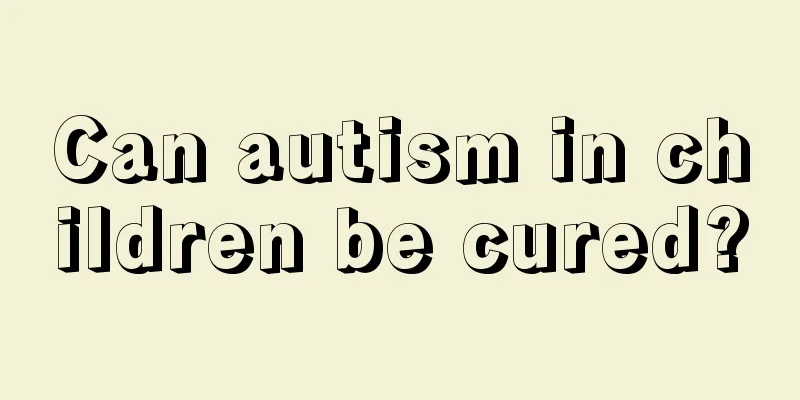What to do if your child has indigestion and stomach pain

|
Our children will also encounter some problems in the process of healthy growth, and many babies need daily care. Sometimes, if babies don’t pay attention to what they eat, it may cause indigestion and stomachache. What should we do? Let’s see how the experts introduce it. 1. For young babies, the common symptom is regurgitation of milk. Older children often have vomiting, which is generally not serious and the vomit has a sour taste. 2. The child may have loss of appetite, abdominal distension, and hyperactive bowel sounds. You can even hear the "gurgling" sound of the stomach without a stethoscope. 3. Bad breath. When milk and food stagnate in the stomach, bad breath often occurs first, especially bad breath and sour mouth in the morning, which are manifestations of milk and food stagnation. Clinically, this is called high-level food withdrawal. When this happens, you can reduce your food intake or skip a meal to help your gastrointestinal function recover. 4. Foul-smelling stool. When there is a small amount of undigested food residue, although there is no loose diarrhea, it is a sign of food poisoning and diarrhea. At this time, you should immediately reduce the amount of food you eat and make adjustments to avoid diarrhea. 5. Refuse to eat. If a child occasionally has a loss of appetite, refuses to eat, or the food does not taste good, do not force him to eat, but let him eat less. 6. Diarrhea and vomiting are often accompanied by abdominal pain. Infants will cry and be restless, while older children will complain of abdominal pain. If the abdominal pain is not severe, it may resolve on its own. 7. Restless sleep at night. Crying with anxiety, hot palms, kicking off the quilt and clothes, and sweating a lot on the head when just falling asleep are all caused by excessive food accumulation in the stomach and intestines, resulting in internal heat. As the saying goes, "If you want your child to be at peace, keep him a little hungry and cold" and "If the stomach is not in harmony, he will not sleep well." As children grow older, especially after adding complementary foods, they should be careful not to eat too much at dinner. Children around 1 year old should not drink or eat a large meal before going to bed. Through the introduction of the above experts, I believe that we should pay more attention to children's indigestion problems and not let the baby always have such problems. At the same time, we must also do a good job of caring for their diet in life. I hope every mother can pay attention to the quality of life of her baby and let the baby grow up healthily. |
<<: What should I do if my child has dry stools?
>>: Solutions for cold hands and feet in children
Recommend
What to do if your child cries and won't sleep
In the process of raising children, you will enco...
How many months old is the baby easier to take care of?
Raising a child is not an easy thing, nor is it a...
What should I do if the newborn has abscesses after receiving BCG vaccine?
Vaccines are something very common in people'...
What to do if baby eczema keeps recurring
Parents are most worried about their children suf...
Precautions for children's back massage
Studies have found that correct pediatric back ma...
What are the symptoms of facial paralysis in children?
In today's social life, children are the trea...
Will babies kick their legs when they have flatulence?
Babies are relatively young and their stomachs ar...
Why do children like to bite their nails?
Biting nails is one of the most common bad habits...
How to treat children with ADHD?
Children are the most playful during this period,...
How to diagnose and treat abdominal lymph nodes in children
Children's abdominal lymph nodes may be the p...
Causes of black face in newborns
Ladies who have just become mothers will definite...
What to do if your two-month-old baby is crying
Babies are not only particularly sensitive when i...
What are the dangers of children's mite allergy?
People always encounter some unexpected situation...
What to do if your child has a fever of 38.3 degrees
Children are the apple of their mother’s eye. Mot...
What to do if your nine-month-old baby has a dry cough
If your baby feels his throat is itchy, he will k...









